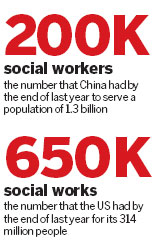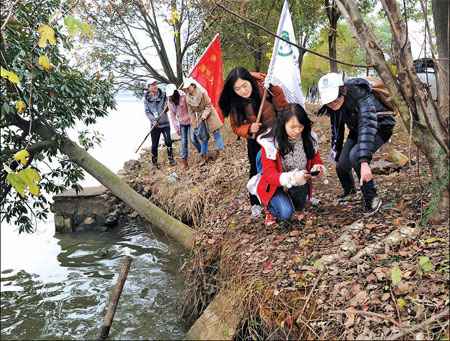US, Chinese universities team up to educate social workers
Updated: 2013-03-11 11:19
By Kelly Chung Dawson in New York (China Daily)
|
||||||||
|
University students in Wuhan, Hubei province, conduct a social program to monitor water pollution in the Central China city. Seven American universities will work with Chinese counterparts in expanding social work education in China. Yang Hongbin / for China Daily |

Before China implemented its one-child policy in the late 1970s, multiple siblings would share the burden of caring for elderly parents. Today, facing huge growth in the population of senior citizens - as many as 480 million by 2050 - the Chinese government and a network of social workers are taking steps to handle the demographic shift.
The government in 2006 set a goal of establishing "an army" of 2 million social workers by 2020. (As of last year, China had about 200,000 social workers serving a population of 1.3 billion. In contrast, the United States had 650,500 social workers for a population of 314 million.)
Toward this goal, the US-based Council of Social Work Education recently announced the China Collaborative, a project in which Chinese universities will be assisted in developing social-work programs by seven graduate departments in the US - the University of Houston, Arizona State University, New York's Fordham University, the University of Alabama, the University of Chicago, Case Western Reserve University in Ohio and the University of Southern California.
Social work was eliminated from academic and professional life during the "cultural revolution" (1966-76), but China over the past two decades has made strides to restore the field. Since announcing its initiative seven years ago, the government has made civil-service exams in social work more inclusive, lowering recruitment standards in hopes of enlarging the work force. Universities have added programs to train social workers.
China currently has 320 colleges that grant undergraduate degrees in social work and 60 universities with master's programs in the discipline. Many of these departments need guidance, and the China Collaborative is aimed at addressing that and other needs, CSWE President Darla Coffey said.
"There is a huge social transformation going on in China today as a result of urbanization, an aging population and the impact of the one-child policy," she said. "The government has realized that China will need more social support.
"This invitation for us to be a part of that development represents the acknowledgement that they don't have to start from scratch. The US and other countries have already been doing this for a long time, and we can help."
Over the next five years, the seven US universities and their Chinese partners will work on developing graduate-program curricula, participate in student and teacher exchanges via Skype and in person, create research opportunities, and provide workshops and instruction.
Each university in China will also share project research and results with other schools nearby, said Ira Colby, dean of the University of Houston's Graduate School of Social Work and a past CSWE president. In Wuhan, for example, a partnership between Arizona State and Huazhong University of Science and Technology has the potential to bring project results to more than 80 universities in surrounding areas.
The China Collaborative is organized by the CSWE's Katherine A Kendall Institute for International Social Work Education, the International Association of Schools of Social Work and the China Association for Social Workers. The nonprofit CSWE is the sole accrediting agency for social work education in the US.
"It is really the beginning of the profession in China, which makes this an incredibly exciting project to be a part of," Colby said. "The conversations people were having in the US in the late 19th century about how to teach social work, what our values are and how those values are reflected day to day - those are the discussions our colleagues are now having in China."
Most faculty members in the field in China don't come from a social-work background; many have degrees in psychology, sociology or political science, Colby said. Working with people trained in a variety of disciplines to craft a curriculum specifically for the Chinese mainland is crucial to the project's success, he said. Different cultural traditions and priorities require a different strategy.
"We have to consider the context and environment. This is not a cookie-cutter approach, and we want to prepare culturally competent practitioners," the Houston dean said. "We have to be very careful, because what might work in Texas might not work in Shenzhen.
"Rather than importing Western models of education, the question is, 'Can we create and support local and culturally relevant models that also integrate a global perspective'? If this works, then we will see this model replicated in other regions of the world."
Coffey also stressed the need for a tailored approach. The CSWE carefully considered each US university program's past work in China, and each was required to pledge $50,000 and five years of commitment to the China Collaborative.
Steve Anderson, director of the School of Social Work at Arizona State and a former Fulbright scholar in China, believes the collaboration will also prove beneficial to the US programs' development.
"When people start out working in China, they think, 'It's a great chance for us to interact with someone at the developmental stage of social work,'" he said. "And while that's a big part of it, it's also reciprocal. We have a lot to learn from the schools we will be working with."
Projects like the China Collaborative are important to the development of social work worldwide, Coffey said. If all goes according to plan, China will eventually have more social workers than the US does. That could change standards and practices in the profession worldwide, the CSWE president said.
"We've been doing social-work education for a long time in the US, but it's a global world, and we need to be engaged in this process," she said. "Our programs are also very likely to be changed in ways we can't anticipate, because once we start thinking about these partnerships, education in US classrooms will also likely change.
"We need to be preparing social workers to work in an increasingly interdependent world."
kdawson@chinadailyusa.com

 In Photos: 7.0-magnitude quake hits Sichuan
In Photos: 7.0-magnitude quake hits Sichuan
 Li Na on Time cover, makes influential 100 list
Li Na on Time cover, makes influential 100 list
 FBI releases photos of 2 Boston bombings suspects
FBI releases photos of 2 Boston bombings suspects
 World's wackiest hairstyles
World's wackiest hairstyles
 Sandstorms strike Northwest China
Sandstorms strike Northwest China
 Never-seen photos of Madonna on display
Never-seen photos of Madonna on display
 H7N9 outbreak linked to waterfowl migration
H7N9 outbreak linked to waterfowl migration
 Dozens feared dead in Texas plant blast
Dozens feared dead in Texas plant blast
Most Viewed
Editor's Picks

|

|

|

|

|

|
Today's Top News
Live report: 7.0-magnitude quake hits Sichuan, heavy casualties feared
Boston suspect cornered on boat
Cross-talk artist helps to spread the word
'Green' awareness levels drop in Beijing
Palace Museum spruces up
First couple on Time's list of most influential
H7N9 flu transmission studied
Trading channels 'need to broaden'
US Weekly

|

|








